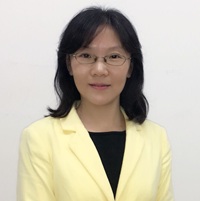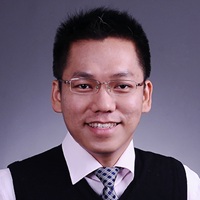KEYNOTE SPEAKERS
Prof. Feng-Kuang Chiang, Shanghai Jiaotong University, China
Bio: Feng-Kaung Chiang is Vice Dean and Professor at the School of Education, and Director of the Future Education Research Center at Shanghai Jiao Tong University. He also serves as Vice Dean of the Shanghai Institute of STEM Education for Youth. He is currently Chair of the International Executive Committee of the International Society for STEM in Education (ISSE) and was previously a Visiting Scientist at the Massachusetts Institute of Technology. His research focuses on ICT for innovative instruction, STEM education, and active learning environments. With extensive expertise in interdisciplinary curriculum design and robotics education, his work bridges theoretical innovation with practical applications in K-12 contexts. Prof. Chiang is Triage Editor of the British Journal of Educational Technology and Sectional Editor-in-Chief of STEM Education. He also serves on the editorial boards of LUMAT: Research and Practice in Math, Science and Technology Education, the Journal of Computer Assisted Learning, Future in Educational Research, and the European Journal of Education. From 2020 to 2024, he was recognized for five consecutive years as one of Elsevier’s Highly Cited Chinese Researchers in the field of education.
Talk Title: Integrated STEM and Robotics Education: China’s Practices and Global Perspectives
Talk Abstract: This talk will explore the transformative role of STEM and robotics education in shaping the future of K-12 learning, drawing on insights from both research and practice. It will highlight effective strategies for embedding STEM into formal classrooms through innovative curriculum design and pedagogy, while also examining how informal STEM experiences influence students’ interests and long-term career trajectories, based on research conducted at Shanghai Jiao Tong University. In addition, the talk will present findings from a five-year global study on the World Robot Olympiad (WRO), analyzing its impact on students, educators, and parents across diverse contexts. The session will conclude by offering practical strategies for designing high-impact STEM curricula and learning activities that integrate formal and informal opportunities, equipping students with the creativity, problem-solving skills, and competencies needed to thrive in the 21st century.

Prof. Shadiev Rustam, Zhejiang University, China
Bio: Dr. Rustam Shadiev is a tenured professor at the College of Education, Zhejiang University, China. His research centers on advanced educational technologies, with a particular focus on their application in language learning and cross-cultural education. He received his Ph.D. in Network Learning Technology from Taiwan Central University in China in 2012. Dr. Shadiev is recognized internationally for his academic achievements. He holds the distinction of Fellow of the British Computer Society (BCS), is a Senior Member of the IEEE, and a member of the ACM. In recognition of his contributions, he was awarded the title of Distinguished Professor by Jiangsu Province in 2019. His scholarly impact is evidenced by his inclusion among China’s most cited researchers in education by Elsevier, Scopus, and Shanghai Ranking for five consecutive years (2020–2024). Furthermore, he was named in Stanford/Elsevier’s list of the Top 2% Scientists worldwide in the field of education and educational research for both 2023 and 2024. Dr. Shadiev contributes actively to academic publishing, serving on the editorial boards of leading journals such as Educational Technology & Society, Journal of Computer Assisted Learning, and Smart Learning Environments. He also acts as guest editor for special issues in prominent journals including Discover Education, Sustainability and Frontiers in Psychology.
Talk Title: From Barriers to Bridges: Transforming Cross-Cultural Learning with AI and Immersive Technologies
Talk Abstract: Cross-cultural learning has become a core educational priority in an interconnected world. Educators and researchers increasingly leverage advanced technologies to enable learning anytime, anywhere, and to scaffold complex intercultural processes. Yet persistent challenges hamper effectiveness: participants from diverse cultural and regional backgrounds often struggle to identify meaningful content to share, to communicate appropriately without causing offense, and to sustain constructive dialogue—difficulties that are intensified when teacher support is limited by scale and time. Another key issue is the lack of authentic experiences and deep immersion into cultural contexts, which are critical for developing genuine understanding and intercultural competence. This keynote examines these issues and demonstrates how emerging educational technologies can address them. Virtual reality can situate learners in authentic, immersive contexts that foster empathy and situated practice. Artificial intelligence can guide interaction, spark culturally relevant ideas, model respectful communication strategies, and provide formative evaluation and feedback at scale. Drawing on results from several empirical studies, the talk will illustrate gains in intercultural awareness, communicative competence, and learner engagement achieved through technology-enhanced designs. Practical recommendations will be offered for curriculum integration, task design, assessment, and ethical considerations, alongside a roadmap for future research on adaptive scaffolding, multimodal analytics, and sustainable implementation. The session aims to equip educators and researchers with evidence-informed strategies to enhance cross-cultural learning through thoughtfully orchestrated VR- and AI-supported interventions.

Prof. Yi Zhang, Central China Normal University, China
Bio: Yi Zhang is a professor and Ph.D. supervisor in the Faculty of Artificial Intelligence in Education at Central China Normal University. She holds a Ph.D. in Educational Technology from East China Normal University and was a visiting scholar at the University of North Texas. Her research interests encompass smart education evaluation and development planning, smart classroom teaching theory and practice, and educational technology standards. She is a member of the National Technical Committee on Information Technology Standardization and serves as a reviewer for Computer & Education. She has led and contributed to over 50 national and provincial-level research projects. She has published more than 150 papers in prestigious journals, including International Journal of Computer-Supported Collaborative Learning, Journal of Educational Computing Research, and Education and Information Technologies, as well as at conferences such as The International Society of the Learning Sciences (ISLS) and International Conference on Blended Learning (ICBL). She has published several academic books, including Research on Smart Classrooms and Informatization in Education, along with numerous textbooks for universities, including Educational research methods and for K-12 education, including Artificial Intelligence · Computational Thinking.
Talk Title: Empowering Education with GenAI-Powered Educational Agents: Design, Research, and Practice
Talk Abstract: To be added......

